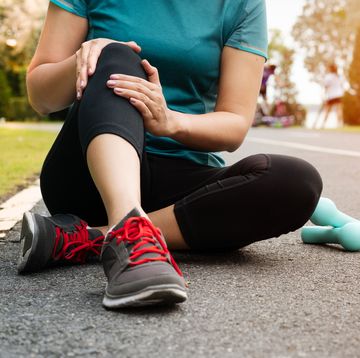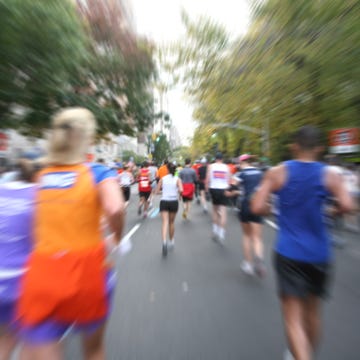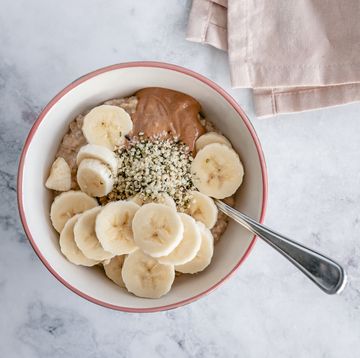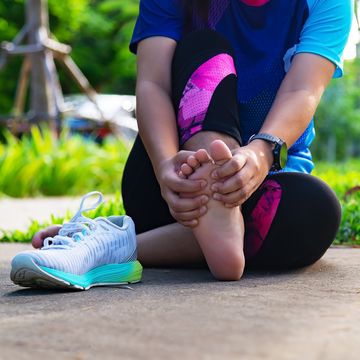Huge, high-profile races like the London Marathon showcase just how amazing running is as a sport. But, as much as we love these big, upbeat occasions involving tens of thousands of participants, running is also about the smaller, day-to-day wins that we accumulate through turning up consistently on the quieter days.
Millions of people across the world run to keep fit, to set themselves personal challenges and to mentally relax. It is also a wonderful way of exploring new places, seeing the world, finding connections with new people and bringing purpose and positivity to your life.
Inspired to lace up those running shoes? Below, we’ve listed 10 of the fantastic benefits of running, whether you are a seasoned runner, or taking your first steps out the door.
What everyone's reading
1. It strengthens your body
When you run, your whole physiology reaps the rewards of your movement. From improving body composition and cardiovascular fitness to reducing the risk of all-cause mortality by 23%, there’s a lot to gain from a sport that can also be pretty fun.
The heart
Among other things, regular running helps to boost your respiratory function, lower your cholesterol, reduce your risk of diabetes and enhance your heart health. In fact, according to leading cardiologist Dan Augustine, ‘if you could put exercise into a pill, it would be better than most drugs that a doctor could give you’. That, in itself, is one mighty selling point for running.
The heart is like an engine. As you run, or do any form of endurance exercise, your heart pumps out more blood so that it can deliver more oxygen to other muscles and organs in the body to keep them working effectively. In return, more blood returns to the heart so that the cycle can continue. The more you run, the bigger and stronger your heart becomes, which means that it can pump out more blood with each heartbeat. This, in turn, means that your heart can deliver the same amount of oxygen with fewer heartbeats, lowering your heart rate. Why does this matter? A lower heart rate is linked with more efficient heart function and better cardiovascular fitness.
The legs
Unsurprisingly, running is a lower limb-centric exercise that variously employs the four main leg muscle groups – the quadriceps, calves, glutes and hamstrings – among other big muscles such as your hip flexors. As you run and repeatedly use these lower body muscles, you’ll gradually increase your muscle strength, build your speed and balance, reduce your risk of injury and improve your running economy. That amounts to many wins.
The joints
Despite popular legend, running won’t wreck your knees – no matter how many people claim that it does. Instead, it can actually strengthen your knees and other joints, with several studies suggesting that recreational runners’ joints are in a better condition than non-runners. A study published in the Journal of Orthopaedic & Sports Physical Therapy, for instance, found that recreational runners had a significantly lower occurrence of osteoarthritis in the hip and knee compared with non-runners.
Research published in the European Journal of Applied Physiology also found that running reduced the concentration of cytokine – proteins that cause inflammation in the knee – in recreational runners.
2. It can help you to live longer (and reduce your biological age)
Various studies add evidence to the pile that running works wonders for your lifespan.
A study published in the International Journal of Environmental Research & Public Health found that running for 75 minutes per week can add a solid 12 years to your life. Looking at 4,400 subjects, it compared those who ran at least 75 minutes a week with those who ran less than 10 minutes a week, showing that big rewards can come from a small, manageable amount of running.
Meanwhile, another study of 55,000 people concluded that running three times a week for an average of just 17 minutes at a time reduced the risk of fatal heart attack or stroke by 55%.
In fact, running can actually help to keep your cells younger, delaying the ageing process at a genetic level. One study, published in Preventive Medicine, investigated the effect of running on telomeres, miniscule caps on the end of our chromosomes that protect our DNA from degradation. These cells shorten as we age, until they become too short and stop functioning, which contributes to aging in the body. The results found that people who exercise for about 30-40 minutes a day, five times a week have significantly longer telomeres. This translated to a biological advantage of about nine years.
3. It can reduce your risk of cancer
While running doesn’t cure cancer, plenty of research suggests that it can help to prevent it. A study published in Cancers (Basel) found that those who engaged in exercise had, for example, a 70% lower risk of developing colon cancer, around 30-40% less chance of developing breast cancer and an overall prostate cancer risk reduction ranging from 5% to 65%. It also concluded that exercise can be used as ‘a complementary part of the medical treatment of cancer patients’.
Another study performed a genetic analysis of nearly 131,000 women from around the world, including nearly 70,000 who had been diagnosed with invasive breast cancer. It found that people who were likely to engage in ‘greater overall physical activity, greater vigorous activity and lower sedentary time’ – based on their DNA – had a 41% lower risk of invasive breast cancer than those who were inactive.
4. Running keeps your mind sharp
While the physical benefits of running are enormous, let’s not overlook the psychological ones.
Research in the Psychonomic Bulletin and Review posited ‘insurmountable' evidence that regular exercise helps to curb age-related mental decline, with Frontiers in Aging Neuroscience also finding that adults over the age of 50 who take up aerobic exercise benefit from better cognitive function and improved blood flow in the brain.
Meanwhile, a new study conducted by researchers from the University of Bristol and the Federal University of São Paulo investigated how aerobic exercise can impact key Alzheimer’s markers. Among several other positive results, they identified that brain inflammation reduced by 55-68% in the exercise group, depending on the inflammatory biomarker considered. Although this evidence – and much of the existing research – is currently limited to animal studies, it still suggests that aerobic exercise has the potential to significantly reduce disease markers associated with Alzheimer’s.
Some evidence even suggests running can help with your decision-making abilities. One study, for example, published in Preventive Medicine Reports, found that high-intensity sprint exercises assisted adolescents with focus and problem-solving.
5. Running can help to improve your mental health
Ever felt more relaxed and energised after a run? If so, you aren’t alone – running is repeatedly cited as an activity that helps to lift mental loads and reduce feelings of stress and anxiety.
A small study conducted by Asics, for instance, measured the brain waves of participants before and after a 20-minute run. It found that even this relatively short bout of exercise led to a 58% reduction in levels of cognitive stress. What’s more, research published in the Journal of Affective Disorders found that running therapy and antidepressants had similar effects on the mental health of patients with depression and/or anxiety disorder.
6. Running needn’t cost much
We all have different budgets and priorities when it comes to running, just like anything else.
While more premium running goods such as carbon plate running shoes and top-end GPS running watches ask for more cash, it’s important to remember that running needn’t cost the earth. Strip things back to basics and all you really need to start running and feel the benefits is a pair of comfortable, supportive running shoes and good-fitting running kit that works with you as you move. As far as sports go, running is one of the most accessible and affordable that you can choose to do.
7. Running gives you ‘me time’
Running is a great way to give yourself permission to do something just for you. As you log the miles you can listen to music, catch up on an audiobook or tune into your favourite podcast. Or, you could leave your phone at home, unplug yourself altogether and be mindful of your breathing and the sights and sounds around you.
Whether it’s to escape the kids or your inbox, or to simply catch some fresh air while you can, carving out time for a run helps to keep the balance of your life in check.
8. Running gives you a chance to enjoy nature
Talking of fresh air, going for a run is a prime excuse to get outside and enjoy the therapeutic benefits of nature. One study published in Environmental Science & Technology found that people who exercised outdoors experienced increased energy levels and decreased feelings of depression. They were more likely to repeat their workouts, too.
Running in a natural environment is also good for boosting your levels of all-important vitamin D, so there’s no better reason to hit the trails or your local park for your next run.
9. Running puts you in control
Adaptable and flexible, running is the ultimate pursuit for personalisation – you can choose precisely how and when you want to approach it.
You can run solo or with others, for fun or to prepare for goal races, for 10 minutes or for two hours, first thing in the morning or as the final activity to wrap up your day. A special benefit of running is that it’s not a one-size-fits-all activity – instead, it’s one that you can slot into your life according to your own targets, preferences and schedule. It’s up to you.
10. Running can boost your happiness
When you go for a run, you can leave negativity at the door, as studies have proven that running can enhance your mood and general sense of wellbeing.
One study, conducted by Glasgow Caledonian University, quizzed more than 8,000 parkrun regulars on their health and wellbeing. On average, they scored 4.4 out of 6 on the Oxford Happiness Questionnaire, which is above the average of score of 4 for the general population. Plus, 89% of parkrun participants said that running regularly made them feel happier and had a positive impact on their mental health – and that’s one of the running's greatest benefits.
11. Running can improve eye health
Your eye health might be the last thing you’re thinking about when you are heading out for a run, but running has wide-ranging and impressive benefits to your blinkers.
One study, published in Experimental Eye Research, found that regular aerobic exercise, such as running, improves blood circulation and reduces inflammation. In turn, this promotes tear secretion and reduces dry eye symptoms.
Running can also lower your risk of developing serious eye conditions such as cataracts and glaucoma.
Research has found that runners have a reduced risk of cataracts, a condition which causes blurred vision or loss of sight due to aging or injury changes in the eye’s tissue. Another study published in Experimental Eye Research found habitual running of more than five miles a day had a 41% lower risk of developing cataracts.
Similarly glaucoma, a serious eye disease that can damage the optic nerve and cause blindness, is less likely in those who do regular aerobic exercise like running. A study in Medicine & Science in Sports & Exercise tracked 9,500 people aged 40–81 over six years and found the most active had half the risk of developing glaucoma compared to the least active. Those running at least 10 miles a week at a 10-minute mile pace qualified as highly active.
12. It improves your ability to sleep well
As a runner, you are probably aware of how important sleep is to recovery and performance. Well, here’s the good news: running itself can actually help you fall asleep faster, and make your sleep more restorative.
Studies have found that regular exercise, such as running, can decrease the amount of time it takes for you to sleep and help to regulate the circadian rhythm – creating more consistent sleeping patterns and deeper sleep stages. This research also means that running can be a useful tool in managing the symptoms of sleep disorders such as insomnia.
For instance, one study published in the Journal of Adolescent Health monitored the sleep patterns of 51 adolescents over three weeks and found that just 30 minutes of moderate running in the morning led to deeper, better-quality sleep in participants. Those that ran in the morning not only fell asleep quicker at night, but also spent more time in slow-wave sleep – the restorative sleep your body needs to function. As a result, they also reported having an increased mental alertness, and an improved ability to focus.

Andy has been Editor-in-Chief of Runner’s World UK since 2007. When he started he hadn’t run a race before, but following the schedules and advice the brand delivers to all runners has since run 24 marathons, including all six Majors, and managed to go under three hours in London in 2013. During his time on Runner’s World, he’s gone toe-to-toe with Mo Farah and picked out the greatest running haircuts. Nowadays he runs mainly for mental health and me-time, but plans to do more trail and ultra races in future when family life permits.
Rachel is Runner's World UK's Senior Content Writer, covering all running-related topics from training advice and gear reviews to race reports and elite runner profiles. Formerly a Website Content Editor and Content Manager at London Marathon Events and The Running Channel respectively, Rachel is well-versed in the running scene and understands what it takes to put on some of the biggest running events in the world. A 2:50 marathoner, she would much rather run 26.2 miles than race a 5K and has currently completed 11 marathons, including five of the six Abbott World Marathon Majors in a sub-3 time. She now hopes to run the Tokyo Marathon to complete the set and become a Six Star Finisher.
Hannah Bradfield is a Senior Nutrition Writer across Women’s Health UK and Men’s Health UK. An NCTJ-accredited journalist, Hannah graduated from Loughborough University with a BA in English and Sport Science and an MA in Media and Cultural Analysis.
She has been covering sports, health and fitness for the last five years and has created content for outlets including BBC Sport, BBC Sounds, Runner’s World and Stylist. She especially enjoys interviewing those working within the community to improve access to sport, exercise and wellness. Hannah is a 2024 John Schofield Trust Fellow and was also named a 2022 Rising Star in Journalism by The Printing Charity.
A keen runner, Hannah was firmly a sprinter growing up (also dabbling in long jump) but has since transitioned to longer-distance running. While 10K is her favoured race distance, she loves running or volunteering at parkrun every Saturday, followed, of course, by pastries. She’s always looking for fun new runs and races to do and brunch spots to try.













